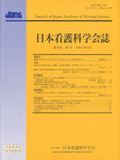Japanese
English
- 販売していません
- Abstract 文献概要
- 参考文献 Reference
- サイト内被引用 Cited by
要旨
小児在宅療養の推進が求められている中,医療的なケアを必要とする重度障害児の増加に伴い,特別支援学校では,平成16年に看護師配置が認められたが,学校をケア付き託児所と間違うような認識があり,教育環境の質向上にはつながっていないという声も聞かれる.そこで,本研究の目的は,学校看護師の専門的役割の明確化に向けて,保護者の子育てに対する考えを表す子育て観がどのようであるかを質的に探求することである.就学中の医療的なケアを必要とする児の保護者29名に半構成的面接を実施し,得られたデータを質的帰納的に分析した.その結果,学校看護師が配置され,学校に子どもを単独で通学させることが可能となった現状から,医療的なケアを必要とする子どもの子育てについて,保護者は,【子どもの特性による対応の難しさ】がある子どもに対して,【安心して預けられる場所がない】中で,【自由度の少ない生活】を送りながら世話をしている,という思いをより鮮明に浮かび上がらせることとなっていた.そのような状況への認識を基盤とし,保護者は①子どもに向かう姿勢,②子育てへの意識,という2つの局面からなる子育て観を構成していた.さらにそこでは,【子ども主体】,【この子のことは親の責任という自覚】と【子どもではなく自分が主体】,【放任】の「子どもとともに成長」と「子どもを切り離す」という〈両極端〉な保護者の子育て観として特徴づけられた,二極化した保護者の認識が明らかになった.それらより,学校看護師は,保護者の参加を前提とし,学校が「子育て」と同時に親の意識改革など「親育て」の「場」となり,教員とよきパートナーシップを築きながら子どもの教育効果が高められるように,子どもと保護者の両者を支援することが必要であると推察された.
Abstract
The objective of this study was to qualitatively evaluate and describe the perception of parents of children at schools for handicapped children on child-rearing in view of the present state of their medical care associated with the positioning of nurses at schools for handicapped children. A semi-structured interview survey was performed in 29 parents of home-cared children of school age who needed medical care, and the data obtained were analyzed qualitatively and inductively. As a result, perceptions of the parents were represented by “child-centered,” “self-rather than child-centered,” “parents being responsible for children,” and “let-alone attitude” in the present situation, i.e., nurses have been positioned at schools for handicapped children in consideration of the limitations of children needing medical care, allowing parents to entrust the care of their children to the school while they are at school. Thus, the positioning of nurses at schools for handicapped children relieved parents from child care and revealed the “polarized” perception of parents regarding child-rearing. These observations suggest that:To improve educational efficiency at schools for handicapped children, each school must become a “field” for “parent-rearing,” which includes perceptive restructuring, as well as “child-rearing” with parents' participation as a basic requirement, and it is important for nurses to support both children and parents by establishing a comfortable relationship with teachers.
Copyright © 2009, Japan Academy of Nursing Science. All rights reserved.


